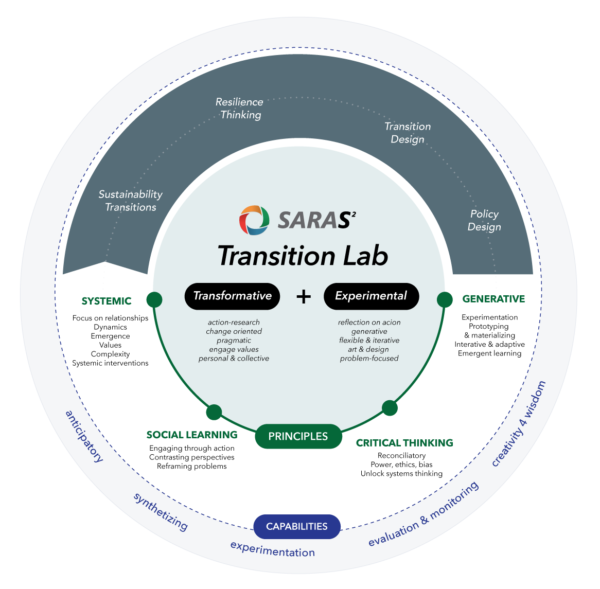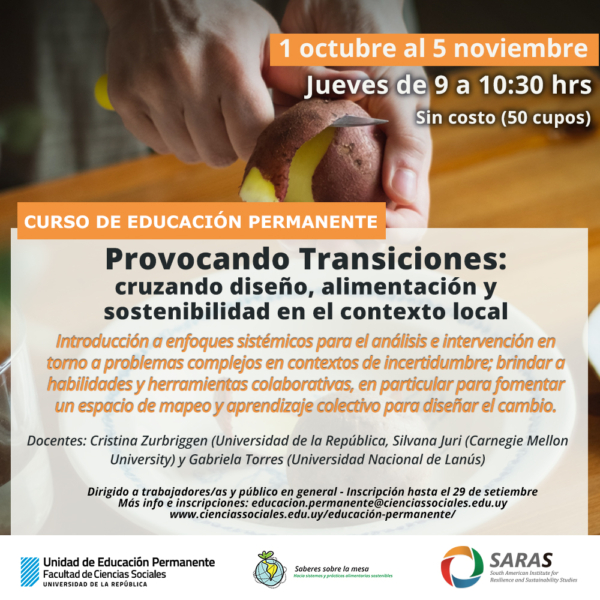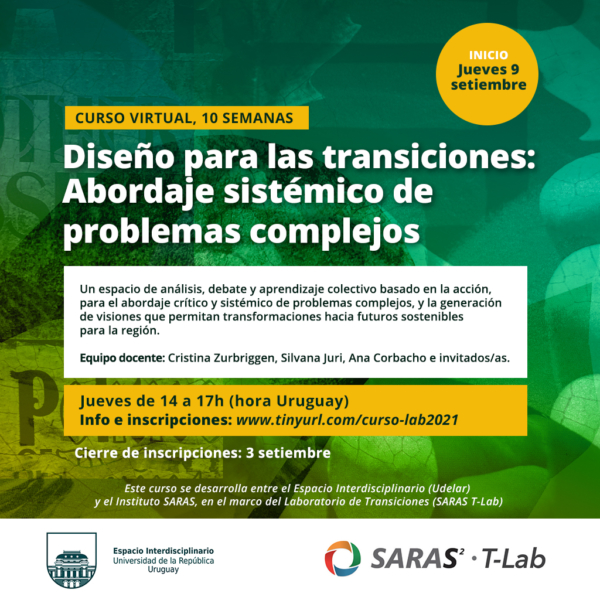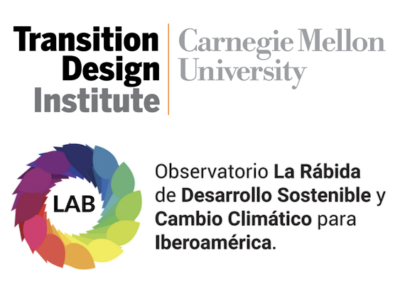Transition Lab (SARAS T-Lab)
DESCRIPTION
The Transition Lab (T-LAB) is a space for creative and experimental innovation to promote transitions and plural trajectories of complex socio-ecological systems in Latin America.
Through active work with communities and their actors, seen as co-researchers, our approach is to explore and generate different narratives and visions of transition to achieve a social value shift, improving the relationship between people, and people and the environment.
WHAT IS A TRANSITION LAB?
It is a space for reflective learning and collaborative research, where we address socio-ecological challenges by creating capacities for empowerment towards social transformations. In this process, we seek new ways of understanding and relating to new world views to mobilize action by exploring, imagining, and developing strategies according to our environments.
Through experimental methods and transdisciplinary research, we support questioning assumptions and values and fostering the materialization of alternatives that can deal with conflicts, tensions, and the inherently political nature of any transition process. For that purpose, the lab is a dynamic platform for action research and transformative learning, articulated through different learning and research spaces that open and expand through work around themes and projects.

PRINCIPLES THAT DEFINE THE LAB
The transition lab is based on 4 principles that allow us to maintain integrative, plural, and contextualized views, promote collective knowledge and move from reflection and discussions to action.
SOCIAL
Aims to actively involve the actors in their context, including contracting plural perspectives in order to identify new ways of modifying and improving situations in an ongoing process of decisions and discussions.
CRITICAL REFLECTION
Aims to explore and identify competing visions, different points of view, narratives, interests, and predominant forms of power that are unavoidable when different stakeholders are involved. This implies a constant reflection on who should be involved in this transformative process, and how conflict and marginalization should be addressed as new ideas, visions, and actions for change emerge.
SYSTEMIC
Aims to include various perspectives and knowledge through a collective commitment that allows the generation of emergent properties based on significant and useful synergistic innovations for the participants and their context.
GENERATIVE
Aims to promote flexible/adaptive alternative paths. This is facilitated through observation, experimentation, reflection, and recognition of new opportunities in an emergent and constant learning process that is materialized through the continuous formulation of provisional proposals (prototypes or (re) solutions).
This type of approach requires the adoption and development of a number of skills and capabilities:
Ability to anticipate (participatory futures)
in order to identify the desired landscape (path) of change and use it to guide collective action, stimulating the imagination to problematize and rethink the taken-for-granted worldviews, which might otherwise limit the emergence of alternative trajectories. Anticipation allows us to democratize our futures, developing new visions that mobilize, inspire, and facilitate actions for transformative change. This process especially addresses the power and influence of narratives and interpretive frameworks that give meaning and sustain the dominant vision of reality in a given context, therefore, it is one of the aspects that we seek to work on and deconstruct, in order to later co-build a new preferable and appropriate reality.
Capacity for synthesis, in order to build bridges between multiple domains of knowledge (such as science, art, and politics) by re-integrating the science of the natural world, the science of human behavior, and decision-making to address complex socio-environmental problems. These transdisciplinary practices require ongoing interaction between actors from different social subsystems (research, politics, civil society, private sector) to include different perspectives and plural types of knowledge (scientific, experiential, indigenous), in order to achieve a deeper understanding of the problem in real life and provide a compass for action. It implies moving from analysis to discussion and synthesis, from thought to evaluation and action.
Capacity for generative experimentation is based on a pragmatic approach (Dewey) that seeks to encourage a collective problem-solving process based on discussions, experimentation and learning in the specificity of each context. The actors “iteratively” refine a concept of (re) solution (an idea, innovation, design, policy, program, etc.) and advance in its provisional implementation. This design process is continually updated and adjusted. Every action is seen as an opportunity to learn about how to adapt to changing circumstances, which involve constant negotiation to move towards proposals that satisfy different stakeholders.
Evaluation and monitoring capacity is necessary in order to learn and guide the action of innovative initiatives that face great uncertainty and that are characterized by their experimental nature, co-creation, and social learning. Here, the unit of analysis for change, and therefore, for evaluation, is no longer the project or program (as in conventional models) but the system and its interaction with the actors.
INTEGRATING THEORETICAL APPROACHES
The T-Lab approach takes a dynamic and open stance toward integrating approaches. For the time being, it is supported by the following systemic conceptual approaches and their tools, but it is conceived as a space in constant construction and development.
DESIGN FOR TRANSITIONS
The framework known as Transition Design (Irwin, 2015) is the backbone for the work format in the Lab. With a design approach that aspires to systemic and social changes from the dimensions of the daily life of people, tools are adopted to understand, visualize, analyze, experiment, and co-create synergistic and holistic interventions, reinforcing existing collective processes and reinforcing capacities for change. This approach especially seeks to open opportunities (instead of proposing single solutions) and to imagine and materialize preferable and plural futures (visions) to take action in constantly creative, iterative, and reflective processes – learning by doing.
TRANSITIONS FOR SUSTAINABILITY
By including theories that study the processes of change in socio-technical systems, the aim is to analyze and understand transitions in different areas and across broad time scales (past and future) as socially determined processes where structures, norms, commercial and political interests, technological innovations, routines, cultural dimensions and actors with different degrees of power, among other factors interact. Models and tools in this broad field help us understand, manage, and drive emerging processes of positive transformation (seeds of change) to establish new, more sustainable regimes.
RESILIENT THINKING
Understanding humans as part of nature, the principles that arise from the apprehension of the transformations in socio-ecological systems help us to advance towards resilient systems, where it is necessary to manage processes of preservation, adaptation and especially, of transformations towards preferred trajectories. This implies managing diversity, participation, learning, innovation, creativity and feedback during processes in diverse and fluctuating states of dynamic equilibrium. It implies developing the sagacity that allows us to “learn to change, to not be changed” (Walker, 2020) in an abrupt or undesirable way, or to be able to quickly get out of adverse states.
POLICY DESIGN
The policy design approach proposes moving towards a systemic, anticipatory and experimental vision of public policies (Ackoff 1974, Checkland & Scholes 1990, Ozekahn 1970), highlighting the key role played by interpretive frameworks that determine the understanding of a problem and its responses – conditioning both the instruments and the way we evaluate policies (Schön & Rein 1991, Peters 2018). Policies are a fundamental part of the structures that reinforce the status quo or that enable alternative ways of regulating life in society – allowing other ways of being and doing. For this reason, intervention in this sphere is decisive in any process of transition and systemic change. From this perspective, it is possible and necessary to intersect not only science and politics but also art.
LIVING LEARNING SPACE
The lab is an active learning platform that is open to host or receive proposals for initiatives and new or ongoing projects, with opportunities for approaching different work topics or focusing on various issues.
The topics and projects currently being addressed by the lab are sustainable food systems and integrated management of water resources.
Projects currently being developed:
The transition from governance models to integrated water resources management (IWRM) entails a systemic and complex challenge, involving multiple actors, diversity of knowledge, world views, and interests that must be articulated. The research strategy includes a case study (Uruguay) that attempts to articulate a situational diagnosis by identifying relevant socio-historical aspects and analyzing the discursive, institutional, and actors’ situation where water resources management is conducted. In addition to carrying out this study on a national scale, the proposal also includes a detailed analysis of two specific basins: Laguna del Sauce and Laguna del Cisne. By combining both scales of analysis, the objective is to create a map of controversies on water resources management.
TEAM: Cristina Zurbriggen, Néstor Mazzeo and Daniel Pérez.
FUNDED BY: Global Water Partnership
Collective Cooking: towards sustainable futures for food systems
Collective Cooking is a platform that through systematization and different spaces for dialogue, aims to make visible and connect the wealth of initiatives that work to ensure more sustainable food systems for Uruguay. From a systemic perspective, it seeks to reinforce synergies, values and disseminate learning, facilitating and supporting food transformations that are sustainable, healthy, and fair. This project and online platform is part of the SARAS Thematic Cycle on Food and Sustainability that synergizes projects of different scopes, focuses, and views.
TEAM: Cristina Zurbriggen, Gabriela Torres, Alejandra Bentancur and Silvana Juri
WEBSITE: http://cocineriacolectiva.net/
The lab is open to receive project proposals and new thematic areas. If you have a proposal, please send an e-mail to t-lab@saras-institute.org
TEAM
Cristina Zurbriggen (criszurbriggen@gmail.com)
Institute of Political Science – School of Social Sciences, University of the Republic / SARAS Institute
Silvana Juri (sjuri@andrew.cmu.edu)
School of Design, Carnegie Mellon University / SARAS Institute
Mariana González Lago (mariana.gonzalezlago@uts.edu.au)
Institute for Sustainable Futures, University of Technology Sydney
Gabriela Torres (gab.tomo@gmail.com)
Master in Sustainable Development – National University of Lanús (Latin American Forum of Environmental Sciences)
PAST ACTIVITIES
Lifelong Learning: “Causing transitions: crossing design, food, and sustainability in the local context”
October 1 to November 5, 2020
More information click here

Course «SARAS2 • T-LAB / Design for transitions: Systemic approach to complex problems I 2021»
Developed between the Interdisciplinary Space (Udelar) and the SARAS Institute, within the framework of the Transitions Laboratory (SARAS T-Lab). It is proposed as an inter and transdisciplinary work/workshop space to promote transition trajectories towards sustainable futures. This is the second-course initiative carried out by the laboratory and with the support of the Transition Design Institute (Carnegie Mellon University, United States).
Through the introduction of the Design for Transitions approach, the course proposes to provide a series of conceptual and methodological tools to address complex problems through the integration of knowledge, the crossing of disciplinary fields and practice, in a research space -action.
More information click here

PUBLICATIONS
Zurbriggen, C., & Juri, S. (2021). Designing transition spaces for sustainable futures: SARAS Transition Lab. In The Future of the Past: Paths towards Participatory Governance for Cultural Heritage. Routledge & CRC Press.
Juri S., Zurbriggen C. Bosch S.& Ortega M. (2021) Transition Design in Latin America: Enabling Collective Learning and Change Journal Frontiers in Sociology DOI=10.3389/fsoc.2021.725053 https://www.frontiersin.org/article/10.3389/fsoc.2021.725053
Juri, S., & Zurbriggen, C. (2022). Motivating transitions towards sustainable and resilient futures: SARAS T-LAB in Latin America. Notebooks of the Center for Studies in Design and Communication. Transition Design II Special Issue, Vol.157, 115–139.
https://fido.palermo.edu/servicios_dyc/publicacionesdc/cuadernos/detalle_publicacion.php?id_libro=960
OTHER LINKS AND RESOURCES
Transition Design Institute (Carnegie Mellon University, U.S.A.)
Vídeo: “Terry Irwin: Designing for Systems-Level Change and Transitions Toward More Sustainable Futures” – Conference RSD2019, Illinois Institute of Design, Chicago.

